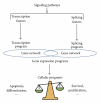Splicing programs and cancer
- PMID: 22132318
- PMCID: PMC3202119
- DOI: 10.1155/2012/269570
Splicing programs and cancer
Abstract
Numerous studies report splicing alterations in a multitude of cancers by using gene-by-gene analysis. However, understanding of the role of alternative splicing in cancer is now reaching a new level, thanks to the use of novel technologies allowing the analysis of splicing at a large-scale level. Genome-wide analyses of alternative splicing indicate that splicing alterations can affect the products of gene networks involved in key cellular programs. In addition, many splicing variants identified as being misregulated in cancer are expressed in normal tissues. These observations suggest that splicing programs contribute to specific cellular programs that are altered during cancer initiation and progression. Supporting this model, recent studies have identified splicing factors controlling cancer-associated splicing programs. The characterization of splicing programs and their regulation by splicing factors will allow a better understanding of the genetic mechanisms involved in cancer initiation and progression and the development of new therapeutic targets.
Figures



References
-
- Hallegger M, Llorian M, Smith CWJ. Alternative splicing: global insights: minireview. FEBS Journal. 2010;277(4):856–866. - PubMed
-
- Pan Q, Shai O, Lee LJ, Frey BJ, Blencowe BJ. Deep surveying of alternative splicing complexity in the human transcriptome by high-throughput sequencing. Nature Genetics. 2008;40(12):1413–1415. - PubMed
-
- Blencowe BJ. Alternative splicing: new insights from global analyses. Cell. 2006;126(1):37–47. - PubMed
LinkOut - more resources
Full Text Sources

